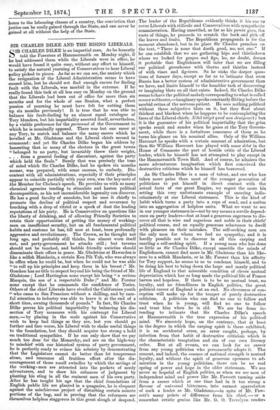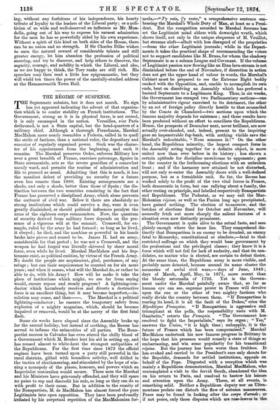SIR CHARLES DI= AND THE RISING LIBERALS.
SIR CE ARLES DTLKE is an impartial man. As he honestly told the Foresters at Hammersmith on Monday night, if he had addressed them while the Liberals were in office he would have found it quite easy, without any effort to himself, to satisfy the natural yearning of Conservatives to hear Liberal policy picked to pieces. As far as we can see, the anxiety which the resignation of the Liberal Administration seems to have caused him, lest he should not find enough excuse for finding fault with the Liberals, was morbid in the extreme. If he really found this task at all less easy on Monday on the ground that the Liberals had been out of office for more than six months and for the whole of one Session, what a perfect passion of yearning he must have felt for cutting them -up six months previously! It is true that he was able to balance his fault-finding by an almost equal catalogue of Tory blunders, but his impartiality asserted itself, nevertheless, by a visible preference for the personnel of the Government to which he is nominally opposed. There was but one sneer at any Tory, to match and balance the many sneers which he levelled at Mr. Gladstone and the Liberal chiefs second in command : and yet Sir Charles Dilke began his address by lamenting that so many of the electors in the great towns "belonged to no party, but invariably threw their weight, . . from a general feeling of discontent, against the party which held the Seals." Surely that was precisely the tone of mind which Sir Charles Dilke, had he spoken six months sooner, was prepared, with some success, to embody. Dis- content with all administrations, especially if their principles appear to coincide partially with your own, was the key-note of the Member for Chelsea's speech. He provides us with as many -chemical agencies tending to stimulate and hasten political -decomposition, as his not inconsiderable ingenuity can discover. He has a good faculty of anecdote, but he uses it chiefly to promote the decline of political respect and reverence by touching with a drop of vitriol or a speck of dust the leading reputations of his party. He is Conservative on questions like the liberty of drinking, and of allowing Friendly Societies to retain their opportunities of getting the money of working- men on insufficient security, but on all fundamental political -habits and customs he has, till now at least, been profoundly aggressive and revolutionary. The Crown, as he thought not long ago, and probably still thinks, has almost worn itself cut, and party-government he attacks still ; but taverns should not be touched, and bubble friendly societies should disseminate their offers in peace. Mr. Gladstone at Hawarden is like a selfish Mandarin, a certain lieu Pih Yuh, who was always in office when he could be, but when he could not be was able "to roll up his principles and keep them in his breast ;" Mr. Goschen has no title to respect beyond his being the friend of Mr. 'Gladstone; Lord Hartington none except his being "a serious Marquis, the son of a respectable Duke ;" and Mr. Forster _none except that he commands the confidence of Tories. Others of the chief Liberals have rivalled the Californian youth 4‘ who came to San Francisco without a shilling, and by care- ful attention to industry was able to leave it at the end of a short time, owning thousands of pounds." In fact, Sir Charles Dilke proves his political impartiality by balancing his dis- section of Tory measures with his contempt for Liberal mien —by placing in the scale against his Conservative -wish to keep bad things as they are, lest you should go further and fare worse, his Liberal wish to shake useful things to the foundation, lest they should acquire too strong a hold -on traditional sympathies. If he can only show that we pay much too dear for the Monarchy, and are on the high-way -to mischief with our historical system of party government, le is perfectly ready to evince his sobriety by demonstrating that the Legislature cannot do better than let temperance alone, and renounce all fruitless effort after the dis- couragement of those small swindles by which the savings of the working-men are attracted into the pockets of needy adventurers, and to show his calmness of judgment by planting his sting in all the eminent men of his own party. After he has taught his age that the chief foundations of English public life are planted in a quagmire, he is eloquent against the mischievous project of disturbing certain minute portions of the bog, and in proving that the reformers are themselves helpless staggerers in this great slough of despond. The leader of the Republicans evidently thinks it his cue to cover Liberals with ridicule and Conservatives with sympathetic commiseration. Having unsettled, as far as his power goes, the roots of things, he proceeds to scratch the bark and pick off the leaves and fruits. The Republican propaganda is for the moment abandoned, but in its place Sir Charles preaches on the text, "There is none that doeth good, no, not one." If he can establish that we are gathering hips and thistledown where we looked for grapes and figs, he, no doubt, deems it probable that Englishmen will infer that we are filling our political greenhouse with thorns and thistles instead of with vines and fig-trees. So he sinks the deeper ques- tions of former days, except so far as to 'intimate that even Russia has a better system of administrative government than we have, and limits himself to the humbler task of discovering or imagining blots on all that exists. Indeed, Sir Charles Dilke seems to have the political malady corresponding to what is called 711U8CCE volitantes,—imaginary specks constantly flitting before the morbid retina of the nervous patient. He 'sees nothing political without these subjective blots on it, but they float about thickest and blackest when he happens to be contemplating the faces of the Liberal chiefs. Nail tetigit quod non denigravit ; but it is the guarantee of his political impartiality that the grim specks remit and sunder when he gazes at the Tory Govern- ment, while there is a fortuitous concourse of them as he turns his glance on his nominal allies. Only of Sir William Harcourt he speaks with a certain amount of admiration, but then Sir William Harcourt has played with some éclat in the House of Commons the part of hostile critic of the Liberal leader, which he himself has not attempted to play except in the Hammersmith Town Hall. And of course, he admires the more adventurous imagination which first conceived the destructive criticism which he himself has borrowed.
As Sir Charles Dilke is a man of talent, and one who has taken more pains than most of the younger generation of politicians to put himself in direct contact with the actual facts of our great Empire, we regret the more his setting this very unfortunate example of sneering indis- criminately at our Liberal statesmen. This is the kind of habit which turns a party into a rope of sand, and a nation into an aggregation of helpless units. What we want to see in our younger statesmen is—not by any means a servile depend- ence on party leaders—but at least a generous eagerness to dis- cover all that is wise and sagacious and noble in their chiefs' political course, and an equally generous reluctance to dwell with pleasure on their mistakes. The self-seeking men are the only men for whom we feel no sympathy, and it is hardly possible not to discover in all this carping and snarling a self-seeking spirit. If a young man who has done so little as Sir Charles Dllke, except unsettle the minds of Englishmen, cannot find more in Mr. Gladstone than his like- ness to a selfish Mandarin, or in Mr. Forster than his affinity for Tory support, he seems to us to condemn himself, and to be doing his best to bring down the large and manly political life of England to that miserable condition of clever mutual depreciation which has so long made the political life of France barren and hopeless. If there is to be no mutual trust, no loyalty, and no friendliness in English politics, the great political career of England is at an end. No cleverness of con- ception will make up for the temper of purely destructive criticism. A politician who can find no one to follow and trust when he is young, will find no one to follow and trust him when he is old. We are far from in- tending to intimate that Sir Charles Dilke's speech at Hammersmith is the true expression of his political mind. We sincerely hope, on the contrary, that at least in the degree in which the carping spirit is there exhibited, it is an accidental error, an error caught, perhaps, by infection from that habit of destructive criticisth which is the characteristic temptation and sin of our own literary order. But at all events, we can look for no career from any young politician who permanently adopts it. The eement, and indeed, the essence of national strength is mutual loyalty, and without the spirit of generous openness to ad- miration in the young politician, there can be no real spring of power and hope in the older statesman. We are never so hopeful of English politics, as when we see men of independent mind and power like Mr. Fawcett turning aside from a career which at one time had in it too strong a flavour of universal bitterness, into earnest appreciation of such a leader as Mr. Gladstone,—in spite of Mr. Faw- cett's many points of difference from his chief, or a somewhat erratic genius like Mr. G. 0. Trevelyan render-
ing, without any forfeiture of his independence, his hearty tribute of loyalty to the leaders of the Liberal party ; or a poli- tician of so wide and well-deserved an influence as Mr. Mun- della, going out of his way to express his earnest admiration for the men he has so powerfully aided by his own experience. Without a spirit of this kind on both sides of the House, there can be no union and no strength. If Sir Charles Dilke wishes to earn the natural reward of considerable talents and still greater energy, let him abandon the profession of political sneering, -and try to discover, and help others to discover, the sagacity, courage, and nobility in which the Liberal, and also, as we are happy to think, the Tory ranks are still rich. His speeches may then read a little less epigrammatic, but they will wield ten times the power of the carefully-studied address at the Hammersmith Town Hall.































 Previous page
Previous page